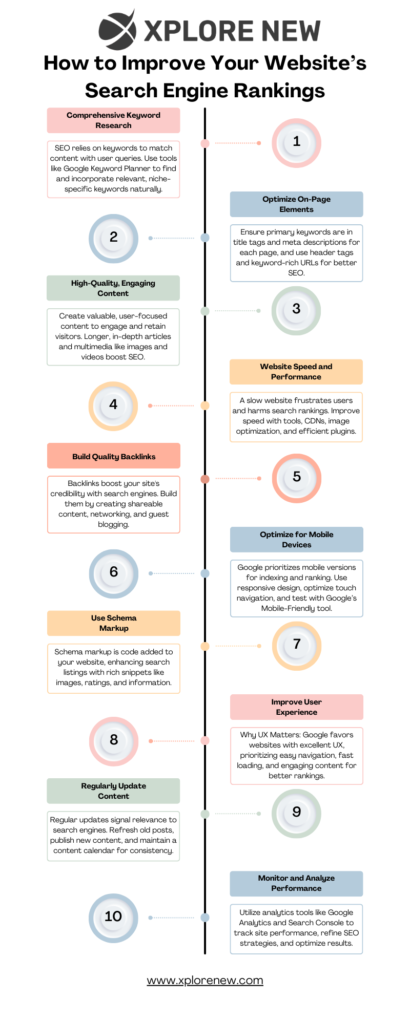How to Improve Your Website's Search Engine Rankings

In today's digital landscape, having a well-optimized website is crucial for businesses and individuals alike. Higher search rankings lead to more visibility, increased traffic, and, ultimately, better conversions. But how do you optimize your website effectively? This guide will walk you through the essential steps to enhance your website's search engine rankings.
1. Conduct Comprehensive Keyword Research
- Why It Matters: SEO is built on keywords. They help search engines understand your content and match it with user queries.
- How to Do It: Use tools like Google Keyword Planner, Ahrefs, or SEMrush to identify relevant keywords. Pay attention to long-tail keywords that are extremely niche-specific and less competitive. Naturally incorporate these keywords into your headers, titles, meta descriptions, and content.
2. Optimize On-Page Elements
- Title Tags and Meta Descriptions: Make sure your primary keywords appear in each page's title tag and meta description, which should be unique for each page. This increases click-through rates in addition to aiding in SEO.
- Header Tags (H1, H2, H3): Organize your content with header tags. The H1 tag should include your main keyword, while the H2 and H3 tags can be used for subheadings with related keywords.
- URL Structure: Keep URLs short, descriptive, and keyword-rich. Refrain from utilizing non-value-adding special characters or numerals.
3. Create High-Quality, Engaging Content
- User-Centric Content: Write content that addresses the needs and questions of your audience. The more valuable your content, the more likely users will stay on your site and share it, improving your rankings.
- Content-Length and Depth: Longer content tends to perform better in search rankings. Aim for in-depth articles that fully cover the topic. However, ensure the content remains engaging and easy to read.
- Visuals and Multimedia: Include images, videos, infographics, and other multimedia to make your content more engaging. Optimize images by compressing them and using descriptive alt text.
4. Enhance Website Speed and Performance
- Why It Matters: A slow website frustrates users and leads to higher bounce rates, negatively impacting your search rankings.
- How to Improve It: Use tools like Google PageSpeed Insights to identify performance issues. To speed up your website, employ content delivery networks (CDNs), optimize images, and take advantage of browser caching. Limit the number of times you use sophisticated plugins and scripts.
5. Build Quality Backlinks
- Importance of Backlinks: Backlinks from authoritative sites act as votes of confidence for your content. They signal to search engines that your site is trustworthy and valuable.
- How to Build Them: Create shareable content that others want to link to. You can also obtain high-quality backlinks by engaging in industry forums, reaching out to influencers, and guest blogging.
6. Optimize for Mobile Devices
- Mobile-First Indexing: Google gives priority to indexing and ranking web pages on their mobile versions. This is known as mobile-first indexing. Ensure your site is mobile-friendly by using responsive design and optimizing for touch navigation.
- Testing: To see how your website functions on mobile devices, use Google's Mobile-Friendly Test tool. Make the required changes to enhance the smaller screen user experience.
7. Use Schema Markup
- What It Is: Schema markup is a code that you add to your website to help search engines return more informative results for users.
- Benefits: It enhances your search listings with rich snippets, including images, ratings, and other information, making your site more attractive in search results.
8. Improve User Experience (UX)
- Why UX Matters: Search engines like Google prioritize websites that offer a great user experience. This includes easy navigation, fast loading times, and engaging content.
- How to Enhance UX: Simplify your website’s design, ensure it’s easy to navigate, and focus on creating a seamless and enjoyable experience for users.
9. Regularly Update Content
- Fresh Content Signals: Regular updates signal to search engines that your site is active and relevant. Update old posts with new information, and consistently publish fresh content.
- Content Calendar: Maintain a content calendar to ensure regular updates and new posts, helping to keep your website fresh and engaging.
10. Monitor and Analyze Performance
- Use Analytics Tools: Google Analytics and Google Search Console provide insights into how your site is performing. Monitor metrics like organic traffic, bounce rate, and conversion rates to identify areas for improvement.
- Adjust Strategies: SEO is an ongoing process. Use data from analytics to refine your strategies, focusing on what works and eliminating what doesn’t.
Conclusion
Optimizing your website for better search rankings is an ongoing effort that requires attention to detail and a focus on user experience. By implementing these strategies, you’ll be well on your way to improving your search engine rankings, attracting more visitors, and achieving your online goals.
Remember, SEO is a long-term investment. Stay patient, be consistent, and adapt to the ever-changing landscape of search engines. Your efforts will pay off with higher rankings and increased visibility in the digital space.

More from our blog
See all postsRecent Posts
- MVP Development Guide: Launch Your Startup Product in 90 Days February 12, 2026
- How to Build a SaaS Product from Idea to Launch in 2026 (Step-by-Step Guide) February 12, 2026
- Influencer Marketing Trends to Know in 2025 January 9, 2025











 by XploreNew
by XploreNew